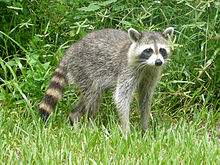Appendix:Toki Pona/kijetesantakalu
Appearance
Toki Pona
[edit]Alternative forms
[edit]Glyph origin
[edit]| sitelen pona | |
|---|---|
| sitelen sitelen |
- sitelen pona: A raccoon sitting down. The glyph was designed by James Flear in 2019, the winner of a design contest for the font linja pona.[1] Compare soweli and waso.
Etymology
[edit]From Finnish kierteishäntäkarhu (“kinkajou”), from kierteinen (“helical”) + häntä (“tail”) + karhu (“bear”). Coined by Sonja Lang in 2009 as an April Fools' Day joke.
Pronunciation
[edit]- IPA(key): /ˈkijetesantakalu/, [ˈkijetesanˌtakalu], [ˈkijeteˌsantakalu]
Audio: (file) - Hyphenation: ki‧je‧te‧san‧ta‧ka‧lu
Noun
[edit]
kijetesantakalu
- (sometimes humorous) raccoon or other procyonid, such as a coati, kinkajou, olingo, ringtail, or cacomistle
- 2021, Sonja Lang, Toki Pona Dictionary, →ISBN:
- kijetesantakalu tonsi li lanpan ala lanpan e soko?
- Does the non-binary procyonid steal mushrooms?
- musteloid, such as a ferret, weasel, otter, or red panda
- an animal that resembles a procyonid, such as a lemur, raccoon dog, or Sinosauropteryx
Adjective
[edit]kijetesantakalu
Verb
[edit]kijetesantakalu
- (transitive, intransitive) to be or turn into a raccoon or procyonid
Usage notes
[edit]- This word was first created as an April Fool's joke in 2009, with the definition "any animal from the Procyonidae family, such as raccoons, coatis, kinkajous, olingos, ringtails and cacomistles." It has since become common to define it more broadly as any animal from the Musteloidea superfamily, which along with the animals listed above also includes weasels, otters, red pandas, skunks, and related species.
- This broader definition was acknowledged by Lang, and the word has since been recognized as essential vocabulary (nimi ku suli) by Lang in her 2021 publication The Toki Pona Dictionary.[2]
- Due to the word's length, it is often pronounced with secondary stress, most commonly [ˈkijetesanˌtakalu], but also frequently [ˈkijeteˌsantakalu].
- According to Linku, this word is classified as "widespread", being used by 75% of respondents in a poll from August 2023.
- In most contexts the word primarily refers to raccoons.
References
[edit]- ^ Flear, James (2019 July 12) “toki! After a week of voting, I present to you the winners of the “New sitelen pona glyph contest””, in Facebook[1], archived from the original on 2023-08-09
- ^ Lang, Sonja (2021) Toki Pona Dictionary, Tawhid, →ISBN, page 249
Categories:
- Toki Pona terms borrowed from Finnish
- Toki Pona terms derived from Finnish
- Toki Pona terms coined by Sonja Lang
- Toki Pona coinages
- Toki Pona terms with audio pronunciation
- Toki Pona lemmas
- Toki Pona nouns
- Toki Pona humorous terms
- Toki Pona terms with quotations
- Toki Pona adjectives
- Toki Pona relational adjectives
- Toki Pona verbs
- Toki Pona transitive verbs
- Toki Pona intransitive verbs
- tok:Mammals
